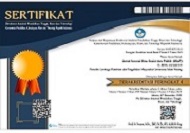Analysis of local wisdom values in the ghofilinan tradition in Katimoho Village, Gresik Regency
DOI:
https://doi.org/10.33474/jisop.v4i1.15645Keywords:
Local Wisdom, Tradition, Dzikrul GhofilinAbstract
The research departed from the phenomenon of the elimination of elements of local culture in society. One of the causes was the current modernization and globalization of all aspects of life, including traditions and culture. The formation of noble values that were able to pattern the behavior of the Indonesian people was due to the decisive role of customs, which became a culture in people's lives. Although the customs and culture of each region were different, in general, they had the same essential values. Traditional and cultural philosophies that have developed in various parts of the Indonesian nation, on average, instill good and positive moral attitudes and behaviors. This research objective was to find the local wisdom values and the Ghofilinan tradition in the Katimoho Village community. This research was a qualitative method. Data were collected from primary and secondary sources. Primary sources were carried out by direct observation (natural observation). For in-depth review, interviews were carried out. Secondary data was obtained through literature study and village documentation. The research results concluded that the Ghofilin tradition had religious, social, historical, and economic values that coexisted with Islamic values. Islam is a religion with a set of values that have influenced the cultural patterns and traditions of the Katimoho Village community. The meeting of Islamic values with the local wisdom values in the Dzikrul Ghofilin tradition was a process of cultural acculturation. It made the socio-cultural aspects of the local community not necessarily eroded by Islamic teachings.References
Affandy, S. (2017). Penanaman Nilai-nilai Kearifan Lokal dalam Meningkatkan Perilaku Keberagaman Peserta Didik. Atthulab, 2(2), 192–207. https://doi.org/10.15575/ath.v2i2.3391
Aliasan. (2019). Pengaruh Dzikir terhadap Psikologis Muslim. Yonetim: Jurnal Manajemen Dakwah, 2(1), 79–93. https://doi.org/10.19109/yonetim.v2i1.3763
Aprianto, Y., Pardede, I. A., & Fernando, E. R. (2008). Kearifan Lokal dalam Mewujudkan Pengelolaan Sumberdaya Air yang Berkelanjutan [IPB University]. http://repository.ipb.ac.id/handle/123456789/32754
Arikunto, S. (2010). Prosedur Penelitian: Suatu Pendekatan Praktik (Edisi Revisi 2010) (Rev.2010). PT Rineka Cipta.
Armiah. (2014). Internalisasi Nilai-Nilai Keagamaan Lewat Media. Alhadharah: Jurnal Ilmu Dakwah, 13(25), 1–14. https://doi.org/10.18592/alhadharah.v13i25.1712
Aslan. (2017). Nilai-nilai Kearifan Lokal dalam Budaya Pantang Larang Suku Melayu Sambas. Jurnal Ilmiah Ilmu Ushuluddin, 16(1), 11–20. https://doi.org/10.18592/jiu.v16i1.1438
Basyari, I. W. (2014). Nilai-Nilai Kearifan Lokal (Local Wisdom) Tradisi Memitu Pada Masyarakat Cirebon (Studi Masyarakat Desa Setupatok Kecamatan Mundu). Edunomic Jurnal Pendidikan Ekonomi, 2(1), 47–56. https://www.fkip-unswagati.ac.id/ejournal/index.php/edunomic/article/view/36
Berkah, H., Brata, Y. R., & Budiman, A. (2022). Nilai-Nilai Kearifan Lokal Tradisi Merlawu bagi Masyarakat Desa Kertabumi Kabupaten Ciamis. J-KIP (Jurnal Keguruan Dan Ilmu Pendidikan), 3(1), 123–130. https://doi.org/10.25157/j-kip.v3i1.6014
Ernawi, I. S. (2009). Kearifan Lokal Dalam Perencanaan dan Perancangan Kota Untuk Mewujudkan Arsitektur Kota Yang Berkelanjutan. Group Konservasi Arsitektur dan Kota Universitas Merdeka Malang.
Fajarini, U. (2014). Peranan Kearifan Lokal Dalam Pendidikan Karakter. Sosio-Didaktika: Social Science Education Journal, 1(2), 123–130. https://doi.org/10.15408/sd.v1i2.1225
Freire, P. (1970). Cultural Action for Freedom. Paperback.
Hafidz, A., & Rusydi. (2019). Konsep Dzikir dan Do’a Perspektif Al-Qur’an. Islamic Akademika: Jurnal Pendidikan Dan Keislaman, 6, 54–77.
Hasbullah. (2012). Rewang: Kearifan Lokal dalam Membangun Solidaritas dan Integrasi Sosial Masyarakat di Desa Bukit Batu Kabupaten Bengkalis. Sosial Budaya, 9(2), 1–21. https://doi.org/10.24014/sb.v9i2.385
Irawan, P. (2006). Penelitian Kualitatif dan Kuantitatif untuk Ilmu-Ilmu Sosial. Departemen Ilmu Administrasi FISIP UI.
Keraf, A. S. (2002). Etika Lingkungan Hidup. PT. Kompas Media Nusantara.
Kumala, O. D., Rusdi, A., & Rumiani. (2019). Terapi Dzikir untuk Meningkatkan Ketenangan Hati pada Pengguna Napza. Jurnal Intervensi Psikologi, 11(1), 43–54. https://doi.org/10.20885/intervensipsikologi.vol11.iss1.art4
Mahdiana, N. (2019). Pembelajaran IPS Berbasis Nilai-Nilai Kearifan Lokal Tradisi Tegal Desa Sebagai Cultural Intelligence. Keraton: Journal Of History Education and Culture, 1(2), 78–87. https://doi.org/10.32585/keraton.v1i2.525
Marianti, D., & Azeharie, S. S. (2018). Komunikasi Transendental Antara Penari Tamborin dan Tuhan. Koneksi, 2(2), 285–292. https://doi.org/10.24912/kn.v2i2.3897
Moendardjito. (1993). Pertimbangan Ekologi dalam Penempatan Situs Masa Hindu-Buda di Daerah Yogyakarta: Kajian Arkeologi-Ruang Skala Makro. Universitas Indonesia.
Muhibuddin, M. (2014). Jalan Menuju Tuhan dalam Pemikiran Kiai Jawa: Telaah Ajaran Gus Miek. Episteme: Jurnal Pengembangan Ilmu Keislaman, 2(2), 347–376. https://doi.org/10.21274/epis.2014.9.2.347-376
Muhson, A. (2006). Teknik Analisis Kuantitatif. Makalah Teknik Analisis II, 1–7.
Musthafa, I. (n.d.). Al Mu’jam al Wasith Juz 1. Maktabah Al Haramain.
Nashihin. (2015). Internalisasi Nilai-Nilai Agama Islam dalam Pembinaan Akhlak Mulia. Ummul Qura, 5(1), 1–10. http://ejournal.kopertais4.or.id/pantura/index.php/qura/article/view/2038
Nurhakim, A. (2019). Faedah Membaca Asmaul Husna. Nu Online. https://islam.nu.or.id/ubudiyah/faedah-membaca-asmaul-husna-WH0u5
Rahmaniar, F. S., Suyitno, Supana, & Siddhono, K. (2020). Keselarasan Kearifan Lokal dengan Nilai Keislaman pada Tradisi Labuhan Gunung Kombang di Kabupaten Malang. Smart: Studi Masyarakat, Religi, Dan Tradisi, 06(01), 113–126. https://doi.org/https://doi.org/10.18784/smart.v6i1.805
Rahyono, F. (2017). Kearifan Budaya dalam Kata (Patent No. C00201701197).
Ratih, D. (2019). Nilai-nilai Kearifan Lokal dalam Tradisi Misalin di Kecamatan Cimaragas Kabupaten Ciamis. ISTORIA: Jurnal Pendidikan Dan Sejarah, 15(1), 45–57. https://doi.org/10.21831/istoria.v15i1.24184
Setiawan, M. A. (2021). Dzikrul Ghofilin Sebagai Media Dakwah Gus Miek. Al Mishbah: Jurnal Ilmu Dakwah Dan Komunikasi, 17(2), 305–328. https://doi.org/10.24239/al-mishbah.Vol17.Iss2.253
Subagyo, J. (2004). Metode Penelitian dalam Teori dan Praktek. Rineka cipta.
Sugiyono. (2014). Memahami Penelitian Kualitatif. Alfabeta.
Suhartini. (2009). Kajian Kearifan Lokal Masyarakat Dalam Pengelolaan Sumberdaya Alam dan Lingkungan,†Prosiding Seminar Nasional Penelitian, Pendidikan dan Penerapan MIPA. Fakultas MIPA Universitas Negeri Yogyakarta.
Zuhro, F. (2020). Pendapatan Da ’ i dalam Perspektif Hukum Islam (Tinjauan Kode Etik Dakwah QS As Saba’:47). Studia Quranika, 5(1), 1–20. https://doi.org/http://dx.doi.org/10.21111/studiquran.v5i1.4258
Zulkarnain. (2009). Kearifan Lokal Dalam Pemanfaatan Dan Pelestarian Sumber Daya Pesisir (Studi Kasus di Desa Panglima Raja Kecamatan Concong Kabupaten Indragiri Hilir Propinsi Riau). Berkala Perikanan Terubuk, 37(2), 69–84. https://doi.org/10.31258/terubuk.37.2.%25p
Downloads
Published
How to Cite
Issue
Section
License
.


_-_Copy.jpg)





